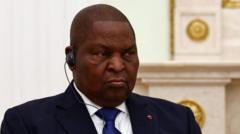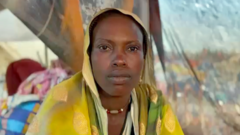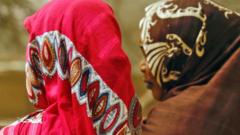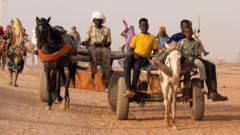President Faustin-Archange Touadéra of the Central African Republic has introduced a meme-coin named $CAR, dubbed an "experiment" to enhance the nation's profile and support development. Despite initial enthusiasm, concerns over volatility and potential scams arise as the currency experiences a drastic value drop, paralleling the challenges faced since the country's adoption of Bitcoin as legal tender.
Central African Republic Ventures into Meme-Coin with Hopes for Economic Revival

Central African Republic Ventures into Meme-Coin with Hopes for Economic Revival
The president of the Central African Republic launches a meme-coin to boost national visibility and development, facing skepticism and economic challenges.
Central African Republic President Faustin-Archange Touadéra has recently taken an unconventional step by launching a meme-coin named $CAR. He branded this initiative as an "experiment" aimed at increasing the global visibility of a nation that ranks among the poorest in the world. Meme-coins, popularized by internet trends, often rely on community engagement to create value, though they come with a reputation for extreme volatility.
The announcement made over the weekend via Touadéra's social media was followed by claims of the meme-coin’s "success," despite reports of its value plummeting by as much as 90%. This development echoes a previous attempt by the Central African Republic to integrate cryptocurrency into its economy in 2022 when it became the second nation after El Salvador to recognize Bitcoin as legal tender. This initiative, named Sango, aimed to attract foreign investment by capitalizing on the country's rich mineral resources; however, it has not met the anticipated success, with the project's official website lacking functionality.
As part of the meme-coin campaign, Touadéra hopes to rally support for national projects, emphasizing educational improvements such as the reconstruction of a declining high school. The President expressed gratitude towards early supporters of the initiative and highlighted the potential of the meme-coin to contribute to national development. However, skepticism surrounds the venture, with critics warning that it may resemble a scam, amplified by the inherent risks associated with speculative investments prevalent in the meme-coin arena.
The Central African Republic's geopolitical climate remains challenging, with ongoing civil unrest adversely impacting economic stability. While the potential for growth through cryptocurrency has attracted attention, past efforts have often floundered, leading to a cautious public response to this latest venture. Notably, the context of cryptocurrency launches worldwide, such as the recent introduction of a meme-coin by former President Donald Trump, reflects a broader trend that has seen similar fluctuations in value and investor interest.
As the Central African Republic strives to establish itself on the global stage, the outcome of this meme-coin experiment remains uncertain, caught between aspirations for economic revitalization and the reality of a precarious financial landscape.


















